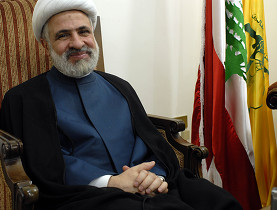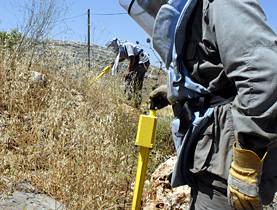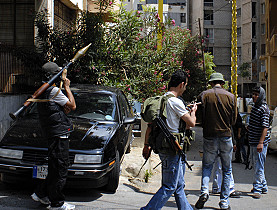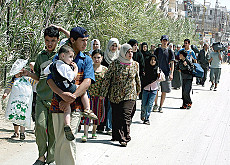Swiss brave criticism for Lebanese coexistence

The peaceful coexistence of different communities in Switzerland could be a model for Lebanon, the Lebanese social affairs minister believes.
Mario Aoun made the comment in the context of the three-day visit to Lebanon of Swiss President Pascal Couchepin, which ended on Sunday.
Couchepin told his Lebanese counterpart, Michel Sleimane, that Switzerland supports Lebanon in its efforts to achieve national reconciliation and was ready to give assistance if requested.
Sleimane came to office just over four months ago after a lengthy period of tension between the parliamentary majority and the opposition, and now presides a government of national unity tasked with creating the conditions for greater stability.
Among the major players represented in this government is Hezbollah, regarded by the US as a terrorist organisation.
But for the Swiss embassy in Beirut contacts with the group form part of its normal diplomatic work.
“We are in regular contact with their members of parliament or their ministers in the context of various dossiers we are dealing with,” Swiss ambassador François Barras told swissinfo. “We have no problem with this since the party is one of the political forces in Lebanon.”
In any case, Switzerland does not share the US evaluation.
“Our country does not regard Hezbollah as a terrorist group,” Swiss chargé d’affaires Carine Carey explained to swissinfo. “Unlike al-Qaida, for example, there is no UN resolution to this effect. In this case Switzerland follows no recommendations other than those coming from the United Nations.”
Dual role
Sheikh Naim Kassem, the deputy head of Hezbollah, and one of its founders, told swissinfo about the group’s aims and policies.
For him, there is no contradiction between being a resistance movement and a political party.
“We have to differentiate between the two main lines of our action, namely resistance to Israel and our political work,” he told swissinfo.
“Our resistance made it possible to liberate southern Lebanon in 2000 and we drove the enemy back in 2006. But we have never used our weapons to further our policies.”
Kassem described the military action launched by Hezbollah in Beirut and its suburbs last May as “an isolated incident”. He accused the pro-government Future Movement of bringing armed men into Beirut to provoke clashes, in order to use this as a pretext to call for general disarmament.
“We decided on a preventative operation,” he explained.
No Islamic state
Many of Hezbollah’s enemies in Lebanon accuse it of having a hidden agenda, namely to establish an Islamic state in the country – something Kassem categorically rejects.
“Of course we believe that an Islamic state is the best way. But the Koran says: ‘There is no constraint in religion’. So there is no question of imposing such a state by force. And then, Lebanon is a special case, and we believe it would be impossible and mistaken to create an Islamic state here, given the multi-confessional nature of the country.”
Ambassador Barras thinks this policy is in Hezbollah’s interest. “The Shiites are a minority in the region. And from what I have seen or heard, I believe that a pluralistic Lebanon is a better guarantee for their security than an Islamic state.”
Military capacity
When it comes to relations with Israel, Kassem is intransigent.
“If Israel evacuates the Shebaa farms to the benefit of Lebanon, we will regard our country as having been liberated. But there is still a problem: Israel’s aggressive nature. If it decides to attack Lebanon again, who will stop it?”
That is why Kassem believes Hezbollah must retain its military capability, as a “backup” for the Lebanese army.
His insistence on this point flies in the face of a UN resolution calling for Hezbollah to be disarmed.
Hezbollah is often described as depending on Iran, but Kassem was keen to put this relationship into context.
“Every confession in Lebanon has external ties. The Christians recognise the authority of the Pope. Our religious reference is represented by Ayatollah Khamenei. But we are completely independent of Tehran as far as our course and our decisions are concerned.”
However, he issued a strong warning about the consequence of a possible military strike by Israel or the US against Iranian nuclear installations.
“If there were to be such an attack, no-one could control the situation. The whole region would be consumed by fire,” he said.
swissinfo, based on an article in French by Pierre Vaudan in Beirut
1982 Founded in the wake of the Israeli invasion of Lebanon, drawing on the Shiite Muslim community. The name means Party of God.
1983 Hezbollah suicide attacks on US and French barracks in Beirut kill 241 and 58 troops respectively.
1990 End of Lebanese civil war.
1992 Hezbollah takes part in parliamentary elections for the first time.
2000 Israel forced to leave Lebanon; Hezbollah widely seen as responsible for expelling its troops.
The Shebaa farms on the border with Syria and Lebanon remain in contention. Israel refuses to hand them to Lebanon on the grounds that they were seized from Syria.
2005 Assassination of Prime Minister Rafik Hariri leads to wide-ranging political change, including the withdrawal of Syrian troops, supporters of Hezbollah.
2006 (Feb) Hezbollah signs agreement with Free Patriotic Front of Michel Aoun; together they form the main opposition force.
2006 (July) Hezbollah attack on Israeli patrol leads to devastating 33-day war, in which Israel destroys much of Lebanon’s infrastructure, but fails in its aim of destroying Hezbollah. Hezbollah is generally regarded as emerging strengthened from the war.
2008 (July) Hezbollah enters government of national unity. One of the government’s tasks is to prepare changes to the electoral system which may give Hezbollah and its allies a parliamentary majority.

In compliance with the JTI standards
More: SWI swissinfo.ch certified by the Journalism Trust Initiative



You can find an overview of ongoing debates with our journalists here. Please join us!
If you want to start a conversation about a topic raised in this article or want to report factual errors, email us at english@swissinfo.ch.